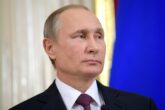December 18, 2024
Putin’s Point of No Return
How an Unchecked Russia Will Challenge the West
The United States and Europe must invest in resisting Russia now or pay a far greater cost later. Russia is likely to walk away from the war (in Ukraine) emboldened and, once it has reconstituted its military capacity, spoiling for another fight to revise the security order in Europe. Because changes to defense spending, procurement, and force posture require significant lead times, Washington and its allies must think beyond the current war in Ukraine and start making investments now to prevent Russian opportunistic aggression later on.
Giving in to Russia’s demands will not make it any easier or cheaper to defend Europe—just look at the events of the past two decades. At every turn—the war in Georgia in 2008, Russia’s first invasion of Ukraine in 2014, and its deployment of troops to Syria in 2015—Putin has grown only more willing to take risks as he comes to believe that doing so pays off. The Kremlin will look to pocket any concessions from the West for ending the current war, such as sanctions relief, to strengthen its hand for the next one.
The U.S. has to set European security on the right path before it can fully and effectively focus on China. Washington undoubtedly has competing priorities that will shift its focus away from the Russian threat—China foremost among them. But to effectively address China, Washington must first set European security on the right path. The United States cannot simply hand off European security to a Europe that is not yet capable of managing the Russian threat. If Washington downsized its commitment to Europe prematurely, Moscow could take it as a sign of growing U.S. disinterest and use the opportunity to press ahead. The prioritization of U.S. policies is important, but so is the sequencing.
Read the full article from Foreign Affairs Magazine.
More from CNAS
-
Trump ‘Humiliated’ as Putin Sends Clear Message That He Doesn’t Care About US
"Putin is not playing ball." Putin's Palm Sunday attack on Sumy is "embarrassing for the White House" as it comes just days after Steve Witkoff met with the Kremlin, says adju...
By Jim Townsend
-
The Hidden Past and Uncertain Future of the U.S. and Ukraine with Celeste Wallander
Under the Trump administration, U.S. support for Ukraine is no longer guaranteed. President Trump's pause on aid and intelligence to Ukraine in March may have been brief, but ...
By Andrea Kendall-Taylor, Jim Townsend & Celeste Wallander
-
Is Russia Under Pressure?
Since 2014, the United States and its allies have provided increasing military support to Ukraine while imposing more and tougher economic sanctions on Russia, especially sinc...
By Jeffrey Edmonds
-
Sharper: Russia and the Axis of Upheaval
Russia’s 2022 invasion of Ukraine served as a dramatic catalyst for strengthening the global axis of upheaval. To sustain its war effort, Russia has imported Iranian weapons a...
By Charles Horn





In a new article for Foreign Affairs magazine, authors Andrea Kendall-Taylor and Michael Kofman outline how to assess the magnitude of the danger and the effort required to contain Russia in the coming months and years.
Read the main takeaways of their article below.